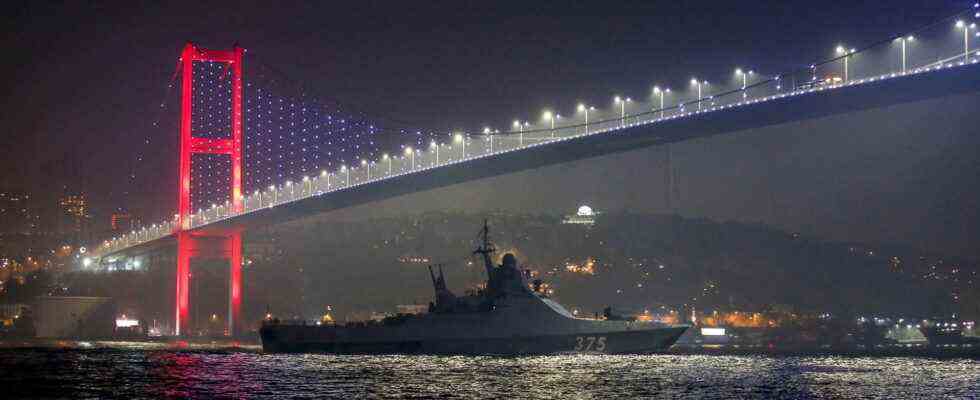Status: 02/26/2022 08:01 a.m
If the Russian Navy wants to move units from the Mediterranean to the Black Sea – or vice versa – it has to go through the Bosphorus. Ukraine demands Turkey to close the straits for the Russian military.
It was a spectacle for observers and a popular pastime for local residents: a Russian submarine crossed the Bosphorus two weeks ago, without being submerged, it drove past the former Sultan’s palace. By daylight. Not unusual, but also to be understood as a demonstration of power by the Russian Navy. Because Russian ships most often pass through the straits, in 2019 they made up two-thirds of all warships.
Although Turkey controls the Bosphorus, free passage has been regulated internationally since 1936. Turkey is allowed to control the ships and also charge fees. Article 2 of the so-called Treaty of Montreux states: “In peacetime merchant ships shall enjoy complete freedom of passage in the Straits, day and night, under any flag and with any kind of cargo, without formalities.”
Rules for warships
There are special regulations for the passage of warships. In peacetime, Turkey must be notified eight days in advance of transit through diplomatic channels. Then a maximum of nine ships may pass individually during the day. There is also a limit on size and tonnage.
Warships that do not belong to countries bordering the Black Sea are not allowed to remain there for more than 21 days. If Turkey is at war, the regulation of the passage of warships is completely in the hands of the Turkish government.
The eye of the needle: The Bosphorus is strategically important – which is why Ukraine is now putting it in the international spotlight.
Image: picture alliance/dpa
Ukraine calls for closure
With the beginning of the Russian attack on Ukraine, the passage through the Turkish Straits comes back into focus. The connection is important for Russia: there is a lively exchange, especially between the Russian military base Tartus near Latakia in Syria and the Black Sea. The base is considered a supply point for the Black Sea Fleet.
Ukraine, through its ambassador in Ankara, has now requested NATO member Turkey to close the Bosphorus and the Dardanelles passage near Çanakkale to Russian ships. This is explosive for Turkey: Because the country has a maritime border in the Black Sea with the neighboring states of Ukraine and Russia and maintains good relations with both states, including economic ones.
Turkey rejects the request
Turkish Foreign Minister Çevuşoğlu today confirmed Ukraine’s official request. However, he makes it clear that the Montreux Agreement is very clear on this point and that Turkey intends to apply the rules as before. This also applies to states that are taking part in a war. The Russian warships will therefore continue to be granted the right of passage to return to their home ports in the Black Sea. This is possible even in a state of war, the minister said.
Historically important passage
The Turkish straits, the Bosphorus and the Dardanelles, which connect the Aegean with the Marmara and then the Black Sea, have often been the scene of political power games. The Ottomans controlled the passage with powerful forts. For centuries, no foreign ship could transport goods between the Black Sea and the Mediterranean without their consent.
With the fall of the Ottoman Empire after World War I, the Bosphorus and Dardanelles came under international control. But soon after Turkey’s independence in 1923, the Turkish ruler Kemal Atatürk wanted to regain sovereignty over the Straits.
Turkey was in a good position as a desirable strategic ally. On July 20, 1936, an agreement was signed in Montreux, Switzerland, which strategically strengthened the still young state of Turkey. During the Second World War, this treaty prevented the naval forces of the Axis powers, long friends of Turkey, from crossing the straits and attacking the Soviet Union.
Turkey has so far had no interest in revising the treaty, although the USA in particular has repeatedly pressed for it. The reason: With a new regulation, the country would lose a military-political and probably also economically important instrument of power.
Turkey in a dilemma
So now another demand to re-regulate the access road. This puts Turkey in a dilemma. Even if President Recep Tayyip Erdogan clearly criticizes Russia for the attack in Ukraine, he actually wants to stay out of the conflict.
The Turkish president, who wants to win an election next year, sees himself more as a possible mediator or mediator between the conflicting parties. The discussion about the blocking of the Bosphorus is rather inconvenient for him, especially since Russia is unlikely to accept it.

